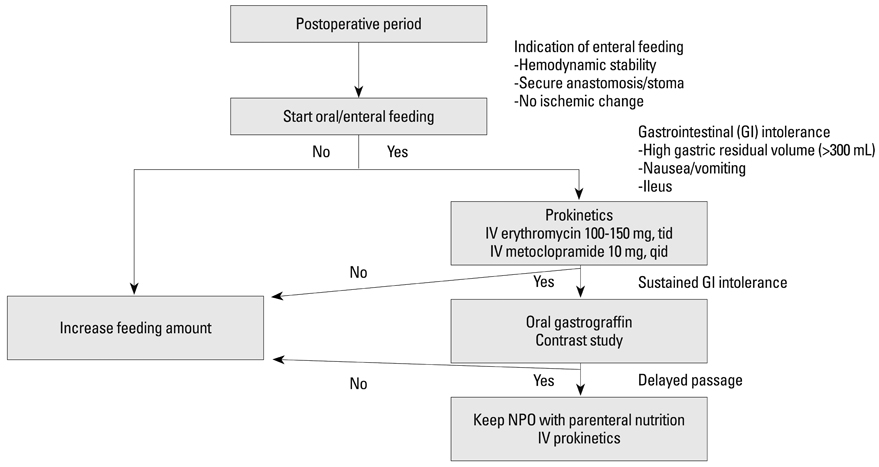Yonsei Med J.
2014 Mar;55(2):395-400.
Early Feeding Is Feasible after Emergency Gastrointestinal Surgery
- Affiliations
-
- 1Department of Surgery, Yonsei University College of Medicine, Seoul, Korea. jakii@yuhs.ac
- 2Department of Surgery, Yonsei University Wonju College of Medicine, Wonju, Korea.
- 3Severance Hospital Nutrition Support Team, Seoul, Korea.
Abstract
- PURPOSE
This study was undertaken to assess the feasibility of early feeding in patients that have undergone emergency gastrointestinal (GI) surgery.
MATERIALS AND METHODS
The authors retrospectively reviewed 84 patients that underwent emergency bowel resection and/or anastomosis from March 2008 to December 2011. Patients with severe shock, intestinal ischemia, sustained bowel perforation, or short bowel syndrome were excluded. Patients were divided into the early (group E; n=44) or late (group L; n=40) group according to the time of feeding commencement. Early feeding was defined as enteral feeding that started within 48 hours after surgery. Early and late feeding groups were compared with respect to clinical data and surgical outcomes.
RESULTS
The most common cause of operation was bowel perforation, and the small bowel was the most commonly involved site. No significant intergroup differences were found for causes, sites, or types of operation. However, length of stay (LOS) in the intensive care unit (1 day vs. 2 days, p=0.038) and LOS in the hospital after surgery were significantly greater (9 days vs. 12 days, p=0.012) in group L than group E; pulmonary complications were also significantly more common (13.6% vs. 47.5%, p=0.001) in group L than group E.
CONCLUSION
After emergency GI surgery, early feeding may be feasible in patients without severe shock or bowel anastomosis instability.
MeSH Terms
Figure
Reference
-
1. Bisgaard T, Kehlet H. Early oral feeding after elective abdominal surgery--what are the issues? Nutrition. 2002; 18:944–948.
Article2. Fearon KC, Luff R. The nutritional management of surgical patients: enhanced recovery after surgery. Proc Nutr Soc. 2003; 62:807–811.
Article3. Giner M, Laviano A, Meguid MM, Gleason JR. In 1995 a correlation between malnutrition and poor outcome in critically ill patients still exists. Nutrition. 1996; 12:23–29.
Article4. Pennington CR, Powell-Tuck J, Shaffer J. Review article: artificial nutritional support for improved patient care. Aliment Pharmacol Ther. 1995; 9:471–481.5. Hill GL, Blackett RL, Pickford I, Burkinshaw L, Young GA, Warren JV, et al. Malnutrition in surgical patients. An unrecognised problem. Lancet. 1977; 1:689–692.6. Kaur N, Gupta MK, Minocha VR. Early enteral feeding by nasoenteric tubes in patients with perforation peritonitis. World J Surg. 2005; 29:1023–1027.
Article7. Pupelis G, Selga G, Austrums E, Kaminski A. Jejunal feeding, even when instituted late, improves outcomes in patients with severe pancreatitis and peritonitis. Nutrition. 2001; 17:91–94.
Article8. Daly JM, Lieberman MD, Goldfine J, Shou J, Weintraub F, Rosato EF, et al. Enteral nutrition with supplemental arginine, RNA, and omega-3 fatty acids in patients after operation: immunologic, metabolic, and clinical outcome. Surgery. 1992; 112:56–67.9. Dissanaike S, Pham T, Shalhub S, Warner K, Hennessy L, Moore EE, et al. Effect of immediate enteral feeding on trauma patients with an open abdomen: protection from nosocomial infections. J Am Coll Surg. 2008; 207:690–697.
Article10. Lassen K, Soop M, Nygren J, Cox PB, Hendry PO, Spies C, et al. Consensus review of optimal perioperative care in colorectal surgery: Enhanced Recovery After Surgery (ERAS) Group recommendations. Arch Surg. 2009; 144:961–969.
Article11. Barlow R, Price P, Reid TD, Hunt S, Clark GW, Havard TJ, et al. Prospective multicentre randomised controlled trial of early enteral nutrition for patients undergoing major upper gastrointestinal surgical resection. Clin Nutr. 2011; 30:560–566.
Article12. Singh G, Ram RP, Khanna SK. Early postoperative enteral feeding in patients with nontraumatic intestinal perforation and peritonitis. J Am Coll Surg. 1998; 187:142–146.
Article13. Malhotra A, Mathur AK, Gupta S. Early enteral nutrition after surgical treatment of gut perforations: a prospective randomised study. J Postgrad Med. 2004; 50:102–106.14. Knaus WA, Draper EA, Wagner DP, Zimmerman JE. APACHE II: a severity of disease classification system. Crit Care Med. 1985; 13:818–829.15. Bone RC, Balk RA, Cerra FB, Dellinger RP, Fein AM, Knaus WA, et al. The ACCP/SCCM Consensus Conference Committee. American College of Chest Physicians/Society of Critical Care Medicine. Definitions for sepsis and organ failure and guidelines for the use of innovative therapies in sepsis. Chest. 1992; 101:1644–1655.
Article16. O'Keefe SJ, Buchman AL, Fishbein TM, Jeejeebhoy KN, Jeppesen PB, Shaffer J. Short bowel syndrome and intestinal failure: consensus definitions and overview. Clin Gastroenterol Hepatol. 2006; 4:6–10.17. Wilmore DW, Long JM, Mason AD Jr, Skreen RW, Pruitt BA Jr. Catecholamines: mediator of the hypermetabolic response to thermal injury. Ann Surg. 1974; 180:653–669.18. Moore FA, Feliciano DV, Andrassy RJ, McArdle AH, Booth FV, Morgenstein-Wagner TB, et al. Early enteral feeding, compared with parenteral, reduces postoperative septic complications. The results of a meta-analysis. Ann Surg. 1992; 216:172–183.
Article19. Lewis SJ, Egger M, Sylvester PA, Thomas S. Early enteral feeding versus "nil by mouth" after gastrointestinal surgery: systematic review and meta-analysis of controlled trials. BMJ. 2001; 323:773–776.
Article20. Braga M, Ljungqvist O, Soeters P, Fearon K, Weimann A, Bozzetti F. ESPEN Guidelines on Parenteral Nutrition: surgery. Clin Nutr. 2009; 28:378–386.
Article21. Bankhead R, Boullata J, Brantley S, Corkins M, Guenter P, Krenitsky J, et al. Enteral nutrition practice recommendations. JPEN J Parenter Enteral Nutr. 2009; 33:122–167.22. Lee HS, Shim HJ, Lee HS, Lee JG, Kim KS. [The safety of early enteral feeding after emergency gastrointestinal surgery]. Korean J Gastroenterol. 2011; 58:318–322.
Article


